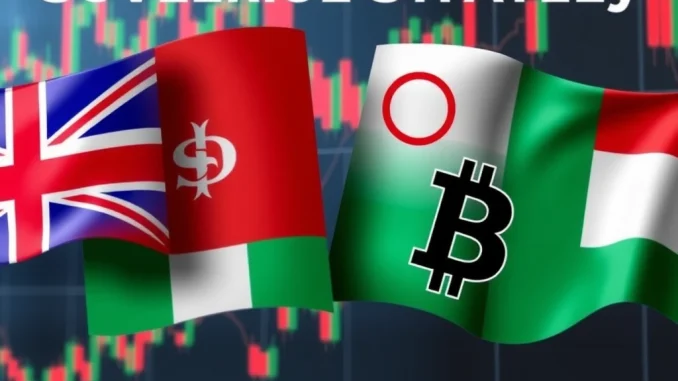
Could a recent move by asset manager VanEck be connected to discussions happening at the highest levels of government? That’s the intriguing possibility raised by one analyst regarding VanEck’s filing for a BNB ETF. It appears the world of traditional finance and sovereign wealth strategies might be intersecting in unexpected ways, potentially involving Binance Coin (BNB).
Decoding the Connection: VanEck’s BNB ETF and CZ’s Vision
The speculation began after former Binance CEO Changpeng Zhao (CZ) revealed he is advising multiple governments on establishing national crypto reserves. Shortly after, VanEck filed for a BNB-linked Exchange Traded Fund (ETF) with the U.S. Securities and Exchange Commission (SEC).
Bloomberg ETF analyst Eric Balchunas pointed out this timing isn’t necessarily a coincidence. In a post on X, Balchunas suggested that while VanEck’s VanEck BNB ETF filing might seem ambitious or even premature to some, it could be informed by Zhao’s insights into potential sovereign interest in digital assets like Binance Coin.
The analyst posits that if national strategies for crypto reserves materialize, including assets like BNB becomes a realistic, albeit speculative, outcome. VanEck’s filing, in this view, could be a strategic positioning move, anticipating future demand from large-scale, even sovereign, investors.
What Are National Crypto Reserves?
The concept of national crypto reserves involves a country holding a portion of its national wealth in cryptocurrencies rather than solely in traditional assets like gold, fiat currencies, or foreign bonds. This isn’t a widespread practice yet, but discussions are clearly happening behind the scenes, as indicated by CZ’s advisory role.
Why might a nation consider this?
- Diversification: Adding a new asset class to national reserves can reduce reliance on traditional systems and assets.
- Inflation Hedge: Some view certain cryptocurrencies as potential hedges against inflation, similar to gold.
- Digital Asset Strategy: Building expertise and holdings in digital assets aligns with the increasing digitization of the global economy.
- Potential Appreciation: While volatile, there’s the potential for significant returns, adding to national wealth.
It’s a complex strategy with significant risks, including market volatility, security concerns, and regulatory uncertainty.
Could Binance Coin (BNB) Be a Candidate?
While Bitcoin is often the first cryptocurrency considered for national reserves (as seen with El Salvador), the idea that Binance Coin could be included is notable. BNB is the native token of the Binance ecosystem, the world’s largest cryptocurrency exchange by trading volume, and powers the BNB Chain.
Factors that *might* make BNB a consideration (from a purely speculative standpoint related to national reserves):
- Ecosystem Utility: BNB has utility within a vast ecosystem, used for trading fee discounts, participation in token sales, and powering transactions on BNB Chain.
- Market Cap & Liquidity: BNB is one of the largest cryptocurrencies by market capitalization, offering significant liquidity compared to smaller altcoins.
- Association with a Major Exchange: Holding BNB could potentially offer strategic advantages or access within the dominant Binance ecosystem (though this is highly speculative and depends on the nature of the reserve strategy).
However, there are significant challenges. BNB is closely associated with a private company (Binance), which has faced regulatory scrutiny globally. Its utility is also tied to that specific ecosystem, unlike Bitcoin’s decentralized nature. These factors make its inclusion in a *national* reserve a more complex proposition than, say, Bitcoin.
The VanEck BNB ETF Angle
An ETF provides institutional investors, and potentially even sovereign wealth funds, with a regulated and familiar vehicle to gain exposure to an asset without directly holding it. VanEck is a major asset manager with a history of pioneering crypto investment products, including successful Bitcoin and Ethereum ETFs in various markets.
Filing for a VanEck BNB ETF in the U.S. is a bold move, especially given the current regulatory climate and the SEC’s cautious approach, particularly towards assets that might be deemed securities. The SEC has not yet approved ETFs for most altcoins, focusing primarily on Bitcoin and recently, Ethereum.
Balchunas’s theory connects these dots: perhaps VanEck sees potential future demand from large entities (like governments building reserves) that would prefer accessing BNB exposure through a regulated ETF wrapper rather than direct purchases on exchanges. This could explain the firm’s proactive, perhaps even early, filing.
What Does This Mean for the Market?
This speculation highlights the evolving landscape of cryptocurrency adoption. While the idea of national crypto reserves is still nascent, the fact that governments are discussing it, and that asset managers might be filing products in anticipation, suggests a potential shift in how digital assets are viewed on a global scale.
For investors, this remains highly speculative. An ETF filing does not guarantee approval, especially for an asset like BNB in the current U.S. regulatory environment. Furthermore, the likelihood of BNB being widely adopted in national reserves is still uncertain and faces significant hurdles.
However, the conversation itself is significant. It indicates that the potential for sovereign interest in cryptocurrencies is real enough to influence the strategies of major financial firms like VanEck. Keep an eye on regulatory developments and further comments from figures involved in advising governments on these matters.
Conclusion: A Glimpse into Crypto’s Potential Future?
The potential link between VanEck’s BNB ETF filing and CZ’s work on national crypto reserves is a fascinating piece of market speculation. While the path to sovereign adoption of cryptocurrencies, let alone specific assets like Binance Coin, is long and fraught with challenges, this scenario paints a picture of a future where digital assets play a more formal role in national financial strategies. VanEck’s move, if truly influenced by this possibility, demonstrates a strategic foresight into potential large-scale demand that could reshape the crypto investment landscape.



